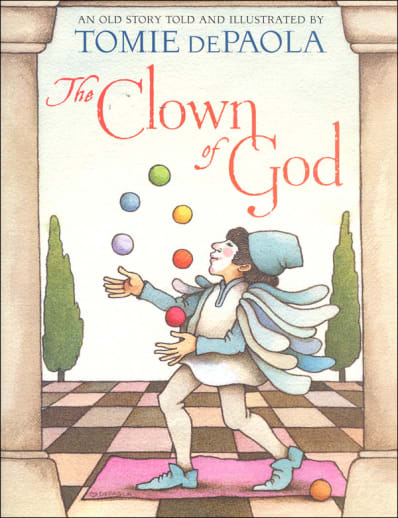"Many, many years ago, in Sorrento there lived a boy named Giovanni who had no mother and no father. He dressed in rags and begged for his food and slept in doorways. But he was happy, and he could do something wonderful. He could juggle." This is how the old French legend begins. This clown who made people smile his whole life is sure to make you smile as well! Your heart will be warmed with the miracle at the end of the story as Giovanni does his last performance before a statue of Our Lady and the Christ Child. Tomie dePaola is the author and illustrator, and he has painstakingly reproduced this old story as close to its original telling as possible. Accompanied by Renaissance-inspired watercolor paintings that are full of vibrant color and cartoon-like characters. elise
The Clown of God by Tomi de Paola
Description
This beautiful new edition of Tomie dePaola's 1978 classic retelling of a French legend stars a little juggler whose unique talent leads him to what might be a Christmas miracle.
Little Giovanni is poor and homeless, but he can do something wonderful: he can juggle.
The people of Sorrento marvel at his talents, and before long, he becomes famous throughout Italy for his rainbow of colored balls that delight the nobility and townspeople alike. But as the years pass, Giovanni grows old, and his talents begin to fail him. No longer a celebrated performer, he is once again poor and homeless, begging for his food.
Until one Christmas Eve, when Giovanni picks up his rainbow of colored balls once more. And what happens next just might be a miracle...
| Product Format: | Softcover Book |
|---|---|
| Grades: | PK-3 |
| Brand: | Simon & Schuster Books for Young Readers |
| Author: | Tomie dePaola |
| ISBN: | 9781534430129 |
| Length in Inches: | 11 |
| Width in Inches: | 8.5 |
| Height in Inches: | 0.25 |
| Weight in Pounds: | 0.45 |

